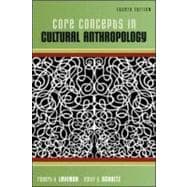
Note: Supplemental materials are not guaranteed with Rental or Used book purchases.
Purchase Benefits
What is included with this book?
| Preface | p. ix |
| Anthropology | p. 1 |
| An Anthropological Perspective | p. 2 |
| The Subfields of Anthropology | p. 3 |
| Is Anthropology a Science? Modernism, Postmodernism, and Beyond | p. 10 |
| Reflexive Anthropology | p. 11 |
| Culture | p. 15 |
| Culture Against Racism: The Early Twentieth Century | p. 16 |
| The Evolution of Culture | p. 19 |
| Culture and Symbolism | p. 21 |
| Ethnocentrism and Cultural Relativism | p. 23 |
| The Boundaries of Culture? | p. 25 |
| The Concept of Culture in a Global World: Problems and Practices | p. 27 |
| Culture: Contemporary Discussion and Debate | p. 30 |
| Culture: A Contemporary Consensus | p. 32 |
| Language | p. 33 |
| Studying Language: A Historical Sketch | p. 34 |
| The Building Blocks of Language | p. 37 |
| Language and Culture | p. 39 |
| Language and Society | p. 41 |
| Discourse | p. 44 |
| Language Contact and Change | p. 47 |
| Culture and the Individual | p. 51 |
| From Individualism to Agency | p. 52 |
| Culture and Personality | p. 54 |
| Enculturation | p. 56 |
| The Self | p. 59 |
| Cognition and Cognitive Anthropology | p. 61 |
| Cognitive Styles | p. 63 |
| Emotion | p. 64 |
| Expressive Culture: Religion, Worldview, and Art | p. 67 |
| Religion | p. 68 |
| Myth | p. 71 |
| Ritual | p. 72 |
| Magic and Witchcraft | p. 75 |
| Religious Practitioners | p. 80 |
| Change in Religious Systems | p. 81 |
| Art | p. 83 |
| The Anthropology of Media | p. 86 |
| The Dimensions of Social Organization | p. 89 |
| What Is Social Organization? | p. 90 |
| Dimensions of Social Organization | p. 92 |
| Caste and Class | p. 96 |
| Race | p. 100 |
| Ethnicity | p. 101 |
| Gender | p. 103 |
| Sexuality | p. 106 |
| Political Anthropology | p. 109 |
| Power | p. 110 |
| Political Ecology and Political Economy | p. 112 |
| Disputes and Dispute Resolution | p. 114 |
| Forms of Political Organization | p. 116 |
| Social Stratification | p. 119 |
| Forms of Political Activity | p. 120 |
| Social Control and Law | p. 123 |
| Nationalism and Hegemony | p. 125 |
| Economic Anthropology | p. 131 |
| The "Arts of Subsistence" | p. 132 |
| Subsistence Strategies | p. 133 |
| Explaining the Material Life Processes of Society | p. 136 |
| Modes of Exchange | p. 139 |
| Production, Distribution, and Consumption | p. 141 |
| Mode of Production | p. 143 |
| Peasants | p. 144 |
| Consumption | p. 148 |
| Relatedness: Kinship and Descent | p. 153 |
| Kinship Versus Biology | p. 154 |
| Descent | p. 156 |
| Bilateral Descent | p. 157 |
| Unilineal Descent | p. 159 |
| Kinship Terminologies | p. 163 |
| Marriage and Family | p. 167 |
| What Is Marriage? | p. 168 |
| Whom to Marry and Where to Live | p. 169 |
| How Many Spouses? | p. 171 |
| Marriage as Alliance | p. 173 |
| Family | p. 175 |
| Globalization and the Culture of Capitalism | p. 179 |
| The Cultural Legacy of Colonialism | p. 180 |
| Analyzing Sociocultural Change in the Postcolonial World | p. 183 |
| Globalization | p. 189 |
| The Cultural Effects of Contact | p. 192 |
| Globalization, Citizenship, and Human Rights | p. 195 |
| Theory in Cultural Anthropology | p. 201 |
| Anthropology as Science | p. 202 |
| Nineteenth-Century Approaches | p. 203 |
| Early-Twentieth-Century Approaches | p. 205 |
| Mid-Twentieth-Century Approaches | p. 209 |
| Late-Twentieth-Century Debates | p. 218 |
| New Directions in the Twenty-First Century | p. 222 |
| Reading Ethnography | p. 227 |
| The Parts of an Ethnography | p. 227 |
| The Use of Indigenous and Local Terms | p. 231 |
| The Photographs | p. 232 |
| Why Are You Reading This Ethnography (and How Should You Read It)? | p. 234 |
| Bibliography | p. 239 |
| Index | p. 250 |
| Table of Contents provided by Ingram. All Rights Reserved. |
The New copy of this book will include any supplemental materials advertised. Please check the title of the book to determine if it should include any access cards, study guides, lab manuals, CDs, etc.
The Used, Rental and eBook copies of this book are not guaranteed to include any supplemental materials. Typically, only the book itself is included. This is true even if the title states it includes any access cards, study guides, lab manuals, CDs, etc.